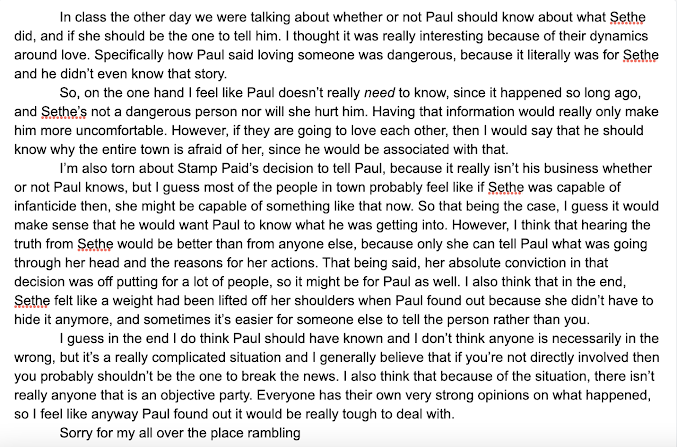Brockway Battle
I thought the whole chapter in Liberty Paints was really interesting and a very well crafted metaphor. The fact that Brockway created the “If it’s Optic White, It’s the Right White” slogan for the company and says “Our white is so white you can paint a chunka coal and you’d have to crack it open with a sledge hammer to prove it wasn’t white clear through” while being a black person creates a really powerful dynamic. Brockway, who believes wholeheartedly in this paint company that has made its name by covering up blackness with white paint, has been moved to the basement of the company away from anybody else. He says it’s because nobody can watch the paint tanks like him, but I have to question if the “Old Man” really believes that or just tells him that to keep him content. It was also interesting reading his thoughts on the union and how the union workers were making life miserable for everyone else, because in reality it’s not the union workers' fault, it’s the company’s fault and they blame it on the union.
I think that the narrator realizes that Brockway will be his future if he continues on the path he’s going down, and that gives him some anxiety. He doesn’t want to be manipulated and controlled by external systems for the rest of his life. I think he was probably so aggressive during their fight because he understood that if he kept kissing up to white authority figures and idolizing them, he would end up as a curmudgeon hiding away alone in a basement all day, not realizing he’s being mistreated.
Now I can’t say for sure where Brockway falls on the scale of characters we’ve met so far, or if he creates his own point. What I mean is, is he similar to the grandpa and Bledsoe in that he obeys and kisses up as much as he can while secretly acting in his own best interest? Or is he completely blinded by the system that continuously mistreats and gaslights him? I do think that because of the irony in the slogan creation, he really is blinded. I’m interested in hearing your thoughts!

This is a super compelling point! I think that I definitely agree with you, especially after you highlight that Brockway was the one who created the slogan! He seems pretty, pretty blinded. It’s also interesting how he seems to enjoy his job so much? It doesn’t sound too appealing to me and he gets no recognition, but he does seem to take pride in it especially because of the “Old Man,” as you explain. So I totally agree!
ReplyDeleteI thought that another really interesting point was how you explain that because Brockway could be a potential future path for the narrator and this gives him anxiety, this feeling could have led to the aggressive attack. The narrator definitely seemed to be having a pretty rough day (and a rough few months, I think). It’s also interesting that ultimately, we know that the narrator will end up in the basement-like space that we saw in the prologue, similar, it seems, to Brockway’s scenario. He seemed pretty content with his bright and lonely room too, which I thought was interesting. (Could his lights be blinding him physically too?)
Such an awesome blog post!
Thanks!
"I think that the narrator realizes that Brockway will be his future if he continues on the path he’s going down, and that gives him some anxiety."
ReplyDeleteon the other hand, brockway seems to contradict the teachings of the college by looking and acting like not much of an important person while actually being the most important person in the factory.
That is, if we truly believe him. We either take his word for him being important or we consider that any number of things he said may have been delusions or attempts at making the narrator respect him.
Brockway seems like an anti-Bledsoe to me, except that as you pointed out in your first paragraph, Brockway too has some opinions/statements to make that seem to put him at odds with the interests of black people.
On my first read, I actually saw Brockway's creation of "If it's Optic White, It's the Right White" as being knowingly ironic/on-the-nose on Brockway's part - as if he, and later the narrator, were having an internal laugh about how none of the others saw the connection. However, after reading your post and rereading that passage a few times, I'm not certain either way of how to interpret that part. I think the rant Brockway later goes on about how the union workers are a "backbiting" and ungrateful bunch towards the white man who gave them jobs does sway me towards the interpretation you present here.
ReplyDelete